 |
 |
 |
 |
 |
 |
 |
 |
 |
Inter Cities Fairs Cup final first leg - Elland Road - 25,268
Scorers: Jones 41 min
Leeds United: Sprake, Reaney, Cooper, Bremner, Charlton, Hunter, Lorimer, Madeley, Jones (Belfitt 70), Giles (Greenhoff 65), Gray
Ferencvaros: Geczi, Novak, Pancsics, Havasi, Juhasz, Szucs, Szoke, Varga, Albert, Rakosi, Fenyvesi (Balint 65)
Now, United were back in another final, held over to the autumn, and
they were determined to make amends for earlier failings. But they faced
probably their biggest test yet, for they were pitted against the crack
Hungarian outfit, Ferencvaros of Budapest. The Magyars were far and away the outstanding team in Hungary, and reckoned
by both Sir Matt Busby and Bill Shankly to be the best across the whole
continent. Star man was 27-year-old striker Florian Albert. Following
the Soviet invasion of Hungary in 1956, and the defection of three of
the country's most famous players, Puskas, Kocsis and Czibor, Albert,
a teenage prodigy, was feted as a national saviour. He scored a hat trick
in the World Cup finals in 1962 against Bulgaria when he was just 21 and
went on to be the tournament's joint leading scorer. In 1964 he led Hungary
to third place in the European championships. He shone in the 1966 World
Cup finals, when he single-handedly devastated world champions Brazil
with a hat trick, and was crowned European Footballer of the Year a year
later. Ferencvaros had provided 89 internationals for Hungary down the years,
and five, Geczi, Varga, Rakosi, Matrai and Fenyvesi, were alongside Albert
in the 1966 World Cup They had won their domestic championship on 21 occasions, with 10 Hungarian
Cup wins. They enjoyed a decent record in European competition, having
appeared in all three tournaments. Their best performance came in 1965
when they won the Inter Cities Fairs Cup by defeating Juventus in the
final after besting Manchester United in a semi final replay. Florian
Albert's 6 goals in the competition were only bettered by the eight of
both Bobby Charlton and Denis Law. In 1963 Ferencvaros had lost to Dinamo Zagreb in the semi-final of the
same trophy, and though they went out in the third round in 1967, Albert
was the competition's top scorer with 8, five coming in a single game
against Sweden's Goteborg. Ferencvaros lost to Inter Milan in the 1966 European Cup at the quarter-final
stage, but Albert was again top scorer, matching the 7 goals of Benfica's
Eusebio. The Hungarian had notched another five goal haul, in a 9-1 massacre
of IBK Keflavik. On their way to the final against Leeds in 1968, Ferencvaros vanquished
Liverpool, Bilbao and Bologna, and few who saw it will forget their magnificent
performance in the Anfield snow in January. Branikovics scored the only
goal, and ended Liverpool's run of 13 games without defeat at home in
any European competition. The first leg of the final was in Leeds on Wednesday, 7 August 1968.
United warmed up for the task with a friendly in Glasgow against Celtic,
who had celebrated a famous European Cup triumph of their own in 1967. John Begg in the Yorkshire Post: 'On their showing against Celtic
in this challenge match at Hampden Park, Leeds United could well be in
for their best season since they returned to top class football. They
were a superbly drilled side against a Celtic team that included no fewer
than eight of their European Cup winning eleven of two seasons ago in
addition to Steve Chalmers, their second half substitute. 'When Celtic won the league championship last season, they scored 100
goals in 34 games, but their attack only once found a loophole in the
Elland Road iron curtain and it came with a penalty kick. This was the
only occasion on which Sprake blotted his copybook. He foolishly bundled
Lennox off the ball in such a manner that the referee had no hesitation
in pointing to the spot. Gemmell, in converting in competent fashion,
sent Sprake the wrong way. It was the only blunder Sprake made and his
brilliant handling was a major contributory factor in his team's success. 'Leeds had weathered Celtic's first half storm and hit back so strongly
it was not surprising when Giles equalised in the 52nd minute. This was
a magnificent goal as Giles met a crossfield ball from Cooper to thunder
it past Simpson from 30 yards. 'United's success was completed when Lorimer got the winning goal. It
was beautifully taken as the Dundee boy gathered a long pass from Charlton
and coolly lashed the ball over Simpson's head in the net as the veteran
goalkeeper moved out in a vain attempt to thwart the winger.' The 2-1 victory sent United into the Ferencvaros game in great heart. United manager Don Revie was desperately
disappointed with the pitiful Elland Road attendance of 25,268. The low
figure was partly due to the game taking place in the middle of a local
bank holiday and partly Gary Sprake recalls: 'We sometimes had disappointing attendances during
these times, despite our continued success. One possible reason was that
Leeds had an excellent Rugby League club and the area was a real hotbed
of the game. It took quite a while for the football club to win these
fans around. Also, Leeds was a very working class area and so many people
couldn't afford to take the family to both Elland Road and Headingley
if fixtures clashed on the same weekend. It was understandable and no
slight on the Leeds players themselves. In fact, I don't really think
it affected the players very much at all. They gave it very little thought,
although it did sometimes drive Don Revie to distraction as he felt that
we deserved better crowds and could only continually compete with the
Manchester Uniteds and Liverpools if we had their gates.' Revie was able to pick a full strength side, though he chose to leave
out his natural wingers, Albert Johanneson
and Mike O'Grady, both thankfully
available again after protracted injury problems. The manager opted instead
for Paul Madeley as a midfield anchorman, supporting Billy Bremner and
Johnny Giles, with Peter Lorimer and Eddie Gray playing wide to supplement
front man Mick Jones when the opportunity arose. The customary back five
of Sprake, Reaney, Charlton, Hunter
and Cooper were all present and correct. It was the same eleven that had
done so well against Celtic. There had been a stream of propaganda coming out of Elland Road over
the summer months that United would opt for a more attacking style in
the new season, but the first signs were not encouraging. Don Revie was
canny enough to know that if he threw caution to the wind, Ferencvaros
were good enough to pick his men off. The Hungarian's coach, Dr Karoly Lakat, pronounced his players 'fit and
in remarkably good form', but indicated that 'a draw will suit us in Leeds.'
True to his words, he sent out a defensively minded eleven, as Richard
Ulyatt reported in the Yorkshire Post: 'Leeds, without a true winger
in the team, had the greatest difficulty in outflanking the first line
of three defenders Ferencvaros fielded and seldom managed to get round
the second line of four players. When they did so, Gray, in particular,
and Lorimer were so slow that the initiative was quickly lost. A good
old fashioned winger might have been in his element against a defence
that was by no means on top form. 'As Leeds interpreted it, free expression, their much vaunted new policy,
seemed to be largely the mixture as before, with Charlton, Bremner, Hunter
and Cooper slightly more The Hungarians had the first chance of the game, when Charlton's hesitation
on the edge of his own area allowed Albert to seize possession. He passed
on to Szoke who was well off target from a decent position. United fought back strongly and came close to a score shortly afterwards.
Ferencvaros keeper Geczi was awarded a free kick virtually under his own
bar. He struck his kick poorly and the ball fell to Jones, loitering with
intent on the edge of the box. He instantly fed Lorimer, who slammed in
a ferocious shot. Geczi made up for his error by making a wonderful save
at the expense of a corner. United had identified the Hungarian keeper as a potential
weakness, as Johnny Giles recalled: 'They might well have gained the stalemate
they wanted ... but for the glaring vulnerability of their goal-keeper
Geczi in dealing with crosses. We remembered that, during the World Cup,
Hungary's goalkeeper had great difficulty in catching these high balls
and, in fact, many people consider that had Hungary possessed a 'keeper
of the calibre of Gordon Banks they would have got through to the final
against England. During the early stages we set out to test Geczi's ability
in this particular department and it didn't take us long to find out that
he, too, was ill at ease when the ball was flighted into his goalmouth. 'From one cross earlier on he dropped the ball straight to the feet of
Norman Hunter, 10 yards out, but the wing-half was so surprised at his
good fortune that he mishit his shot and was well off target. Geczi lost
his nerve and I cannot recall him holding one cross ball all evening!' Leeds had much the better of the possession as the Hungarians allowed
them to pass the ball round as they would as long as they were out of
shooting range. United looked good until the final ball and penned Ferencvaros
back for long periods, though they usually had to settle for corners.
Indeed, it was the visitors who exhibited the better shooting. In one
move, Albert and Varga got the better of Giles and Madeley in midfield
to free Fenyvesi on the wing. He centred for Szoke but the chance was
lost when the forward tried to shift the ball from left to right foot
before shooting. Towards the end of the half, though, the United pressure told, with Geczi
under pressure in his goal area from Charlton, Bremner and Jones. When
Jones forced a corner, United, renowned for their dead ball routines,
gleefully capitalised. Giles: 'Mick Jones grabbed Leeds United's goal just before the interval
after Geczi had again blundered in the air. To be fair to him, though,
I thought his fellow defenders were equally to blame. We were awarded
a corner on the right and as Jack Charlton took up his familiar position
on the goal line, the Hungarian defenders surrounded him in an effort
to 'protect' Geczi. But they succeeded only in making his job a lot more
difficult. As the ball came across from Peter Lorimer, there were so many
bodies in the goalmouth that Geczi could only get his fingertips to it.
The ball broke loose from the ruck, and there was Jones on the spot to
add the finishing touch. The goal came in the 41st minute and United reached the break one goal
ahead. Leeds started the second half with intricate passing, rather than using
the wind that was now in their favour. On too many occasions they ran
the ball into trouble and the Ferencvaros centre-back, Juhasz, was proving
the devil's own job to beat, as Ken Jones reported in the Daily Mirror:
'Where there was trouble, there was Juhasz, a defender whose ability was
only matched by his professional instinct. There did not seem to be a
trick that Juhasz did not know. He was finally booked for destroying a
Leeds attack with his hands and there was a certain humour in that.' The Hungarians also had their moments at the other end, as reported by
Richard Ulyatt in the Yorkshire Post: 'Albert showed what might happen
in Budapest when acting as a true centre-forward on his own ground. He
raced from defence into attack, giving Szoke a long pass which was too
accurate for the defence to intercept. If Szoke had returned the ball
instead of shooting wildly, Leeds might have been in dire trouble.' After 65 minutes, both teams made a change. Ferencvaros brought on Balint
for Fenyvesi, while Giles had to go off with double vision. He recalled
later, 'My mishap occurred deep in the Ferencvaros half. With my back
to the goal, I tried to get my head to a long ball through the middle
and collided with an opponent challenging from behind. Everything went
black and I must have been out cold for two or three minutes. When I regained
consciousness I was aware of trainer Les Cocker sponging my neck with
cold water and holding smelling salts under my nose. I tried to get back
on my feet, but felt so dizzy that it was obviously pointless carrying
on. That was the last I saw of Ferencvaros in the sense of opposing them
on the field, for I missed the return leg in Budapest through injury.' Jimmy Greenhoff came on for Giles
and was quickly into the action when he got a header on goal. Five minutes later, Leeds had to use their second sub, as reported by
Eric Todd in The Guardian: 'There was serious trouble on the field
for the first time. Jones was going through and as he entered the penalty
area, Geczi advanced and threw himself - there is no other expression
for it - at the Leeds centre-forward. If this had been a Rugby match,
Leeds would almost certainly have been awarded a penalty try. It transpired,
however, that the whistle had been blown before Jones embarked on his
solo run so that no goal and no penalty would have been allowed in any
case. Nevertheless it was a shocking foul which merited some sort of punishment.
Geczi, applauded so many times previously, now was jeered repeatedly while
the hapless Jones was removed on a stretcher and his place was taken by
Belfitt.' Those changes broke up United's rhythm and allowed the Hungarians to
come into the game as an attacking force and Charlton did well to rob
Varga on the point of shooting. Later, Rakosi was foiled by a brilliant
save from Sprake, when he looked to have an easy chance. That was the final chance of a tight game and United were disappointed
to have just the one goal advantage, as Don Revie admitted: 'It is going
to be tough in the second leg, but we have faced this kind of thing before.
Ferencvaros played as well as we expected them to. The fact that we kept
a clean sheet was a good thing. If we get a goal over there they have
got to get three.' Revie was not pleased with the rough tactics of the visitors: 'They were
body checking, deliberately handling and obstructing … Some of it was
diabolically clever and screened. Mick Jones has been lucky. He was kicked
in the groin and it is sore, but it could have been worse.' Jones himself said, 'I had to take some punishment. As the target man
I always expected a tough game, but the Hungarians were really cynical.
I remember an incident with their goalkeeper Geczi when we both went for
a fifty-fifty ball. As I went for the ball he came out and jumped up with
his leg in the air and hit me straight in the middle. I thought he'd broken
me in two. Luckily, I jack knifed to take the blow instead of taking the
hit straight in the stomach. Nowadays he'd have been sent off, but he
got away with it. I was 'Naturally, I was pleased to score our goal, even if it was scrappy,
poking the ball in from about two yards with a number of defenders around
me, but it was one of the most important goals I scored for Leeds. It
gave us something to take into the second leg.' Dr Karoly Lakat, the Ferencvaros coach, saw things differently,
saying: 'It was more fighting than a real game of football. Leeds played
the more vigorous and forceful football. I thought our team were the better
technicians. I could not see clearly what happened when Leeds scored because
I was too far away, but the goalkeeper says he was definitely pushed.' Ken Jones summarised the night thus: 'The reputation of Ferencvaros as
a team of glowing quality was lost last night as they succumbed to the
cynicism of European football. For Leeds, on the threshold of a season
when they have promised to play with more ambition, it was a frustrating
experience. Without a better than fair share of the breaks on the return
in Budapest on 11 September, a one-goal lead is unlikely to be enough. 'It began with the obvious intention of running Ferencvaros into the
floor. But in the search for a reason why their industry did not bring
them more than one goal, Leeds may discover the root of their problems.
They threw players forward from midfield and played with ambition and
aggression. But merely increasing the number of attackers cannot balance
Leeds' shortage of attacking talent. 'Billy Bremner, Norman Hunter, Paul Madeley and even Jack Charlton tried
to squirm through the ranks of Ferencvaros defenders. But they were rarely
allowed a clear sight at goal and it is significant that Leeds scored,
as they did so many times last season, from a dead ball kick.' It was a scathing assessment by Jones, but, for all the disappointment,
United had secured a considerable victory against formidable opponents
and could fly out to eastern Europe in upbeat mood. 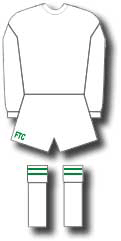
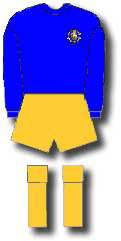 Since
making their Fairs Cup bow in 1965, Leeds United had established something
of a reputation as peerless exponents of the classically cautious European
style. At their first attempt, they made it all the way to the semi-finals,
before being outclassed by Spain's Real Zaragoza in a replay.
A year later, they went one better and made it to the two-legged final,
before again being beaten by a better side when Dinamo
Zagreb turned them over.
Since
making their Fairs Cup bow in 1965, Leeds United had established something
of a reputation as peerless exponents of the classically cautious European
style. At their first attempt, they made it all the way to the semi-finals,
before being outclassed by Spain's Real Zaragoza in a replay.
A year later, they went one better and made it to the two-legged final,
before again being beaten by a better side when Dinamo
Zagreb turned them over.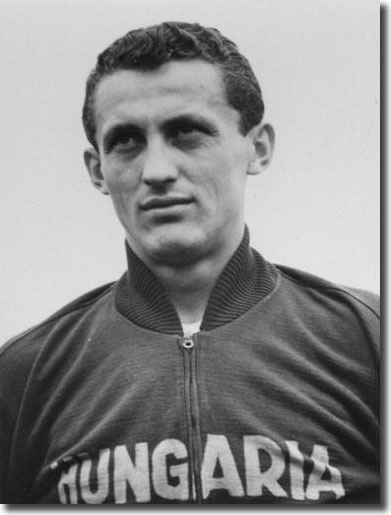 party.
party.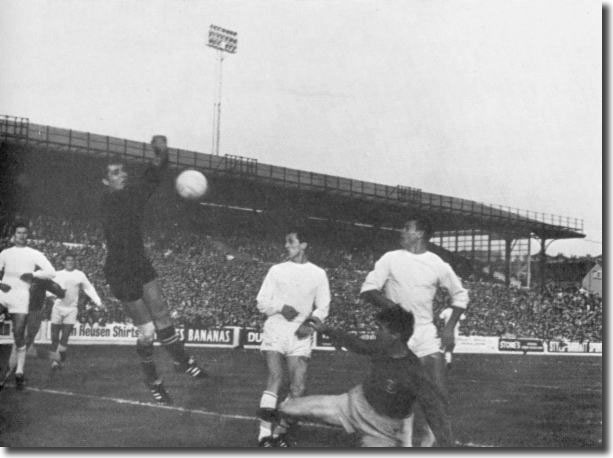 because the game was broadcast live on national
television.
because the game was broadcast live on national
television.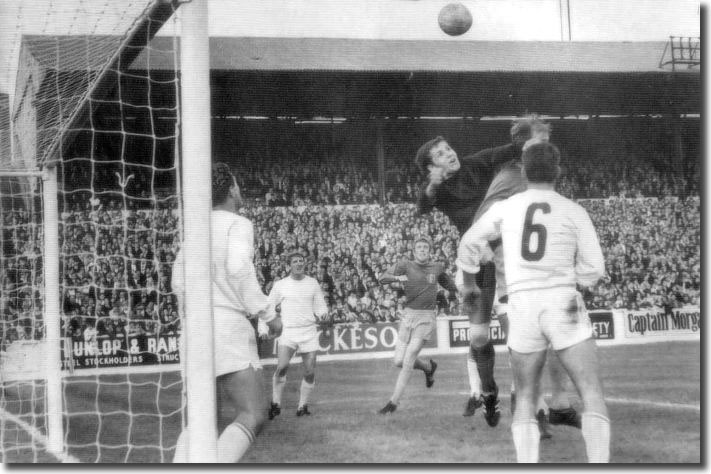 frequently on attack, and Madeley dropping back
as a second centre-half, the sort of thing we saw time after time last
season. There was no increased effort by the forwards in the face of keen
and sometimes ruthless spoiling, except perhaps from Jones, who was much
more like a £100,000 player than during last season.'
frequently on attack, and Madeley dropping back
as a second centre-half, the sort of thing we saw time after time last
season. There was no increased effort by the forwards in the face of keen
and sometimes ruthless spoiling, except perhaps from Jones, who was much
more like a £100,000 player than during last season.'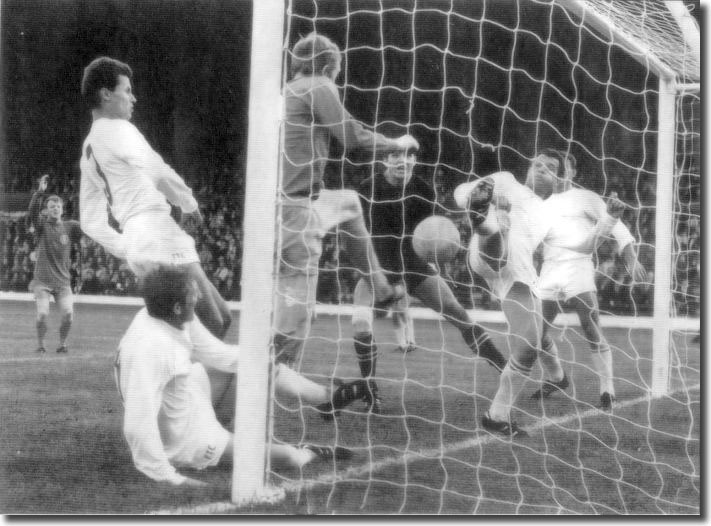 'I
am told that Ferencvaros complained bitterly afterwards that Charlton
had impeded Geczi, but I regard this as sour grapes! I didn't see anyone
protest to the referee when the ball went into the net and, knowing how
excitable these continental players can be, I am sure all hell would have
broken loose on the pitch had our opponents really believed they had been
done an injustice.'
'I
am told that Ferencvaros complained bitterly afterwards that Charlton
had impeded Geczi, but I regard this as sour grapes! I didn't see anyone
protest to the referee when the ball went into the net and, knowing how
excitable these continental players can be, I am sure all hell would have
broken loose on the pitch had our opponents really believed they had been
done an injustice.'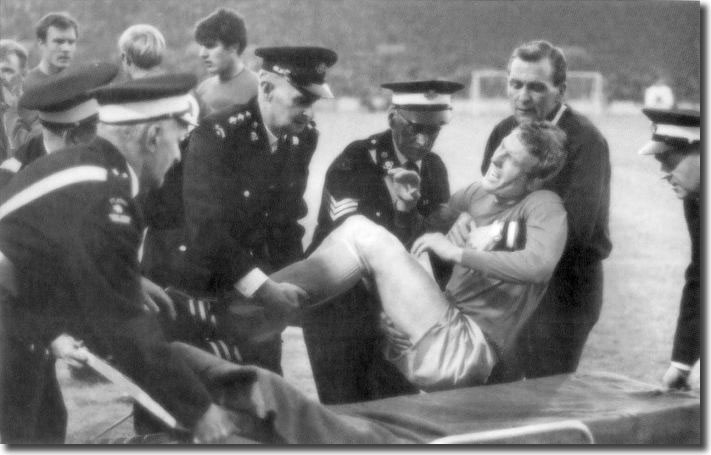 carried off. It was a good result, though, because
we hadn't conceded an away goal.
carried off. It was a good result, though, because
we hadn't conceded an away goal.